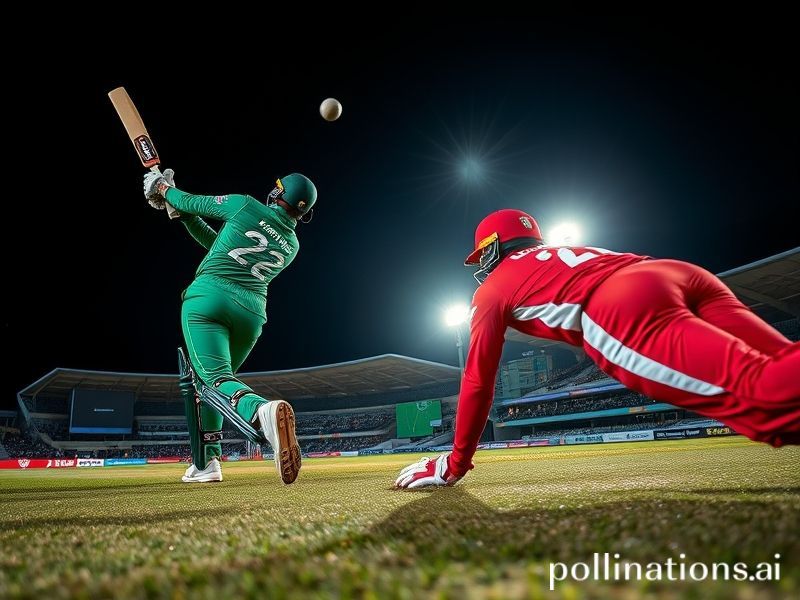Desert Pitch, Global Stage: How a Cricket Match Between Pakistan and Oman Became the World’s Most Absurd Geopolitical Rorschach Test
“Pakistan vs Oman” sounds, at first glance, like the geopolitical equivalent of two middle-managers bickering over the thermostat. Yet the phrase has been ricocheting across cricket forums, foreign-policy Slack channels, and—because nothing escapes late-stage capitalism—crypto-discord servers promising “risk-free arbitrage” on the match outcome. Which is to say, the confrontation du jour is ostensibly a cricket game, but never underestimate humanity’s gift for turning a children’s bat-and-ball pastime into a proxy battlefield for existential dread.
The fixture itself, a T20 World Cup qualifier, is being played in a desert stadium so new it still smells like fresh paint and unpaid migrant labor. Pakistan arrives as the perpetually “almost” side of international cricket: nuclear power, 240 million citizens, and yet forever one dropped catch away from national collapse. Oman, meanwhile, is that discreetly wealthy colleague who commutes in a modest Lexus but has a vacation home on the moon. Rank outsiders on paper; geopolitically, they’re gatekeepers of the Strait of Hormuz—one-tenth of the planet’s oil sails within earshot of the stadium’s PA system. If the lights flicker mid-match, global markets do the wave.
For the broader world, the game is a compact metaphor. On one side: Pakistan, a country whose GDP growth forecast is revised downward more often than its bowlers’ speed readings. On the other: Oman, a sultanate that has quietly mastered the art of surviving by smiling politely at absolutely everyone—Washington, Tehran, Beijing, even the British Museum when it wants its relics back. While Pakistan’s captain fields press questions about match-fixing rumors and the IMF, his Omani counterpart is asked whether the post-game buffet will feature camel biryani. Both queries are, in their own way, about sustainability.
Viewed from Brussels, Washington, or whatever passes for a think-tank in Singapore, the encounter is a stress test for the “soft power on a budget” era. Qatar and Saudi have spent petrobillions buying entire sports leagues; Oman, allergic to vulgarity, simply hosts the match, ensures the Wi-Fi works, and lets the inevitable Twitter meltdowns do the marketing. Pakistan, meanwhile, demonstrates its soft power by having twelve expat fans storm the commentary box to shout “Pakistan Zindabad” until security escorts them out, politely, in four languages. Globalization at its most symmetrical: everyone gets a meme, no one gets dignity.
The cynical subtext is that neither country can afford to lose. For Pakistan, defeat would coincide nicely with a rupee in free fall and the annual monsoon that turns urban infrastructure into origami. For Oman, an upset victory risks the polite fiction that it is merely a neutral logistics hub, forcing the sultanate to admit that—yes—it too can weaponize nationalism when convenient. The West watches like a divorcing couple eyeing the dog: whoever appears kinder at the moment gets custody of the moral high ground, at least until the next news cycle.
Meanwhile, the broadcast feed is piped into sports bars from Nairobi to New Jersey, where diaspora uncles argue over whether the umpire’s call was influenced by Big Oil, Big Pharma, or Big Halal Meat. In a Dublin pub, a philosophy PhD student scribbles notes for a dissertation chapter titled “Post-colonial Masculinity and Reverse Swing Bowling.” Humanity’s ability to overthink a 20-over sideshow would be endearing if it weren’t also why we still can’t coordinate climate policy.
At the death overs, the match tightens to cliché: Pakistan needs six off two balls, the sort of arithmetic that has decided weddings, parliaments, and at least one coup. The bowler—a 19-year-old whose day job is data entry—delivers a wide. Twitter declares the end of civilization. The next ball is a dot, and civilization is restored. The final delivery is smashed for six, triggering simultaneous fireworks in Lahore and a 2.3 percent dip in Oman’s sovereign-fund futures, because traders love a metaphor.
Pakistan wins. Oman applauds with the graciousness of a host who secretly knows the guests will be fighting over inheritance before dessert. Both teams shake hands, swap jerseys, and pose for the sort of photographs dictators use on currency. Somewhere, a hedge-fund algorithm recalibrates South Asian geopolitical risk; elsewhere, a teenager in Muscat decides to apply for a Pakistani university because the bowler looked cool. Soft power, like cricket, is mostly nonsense—until it isn’t.
And so the world spins on, comforted by the illusion that a boundary rope keeps chaos at bay.







